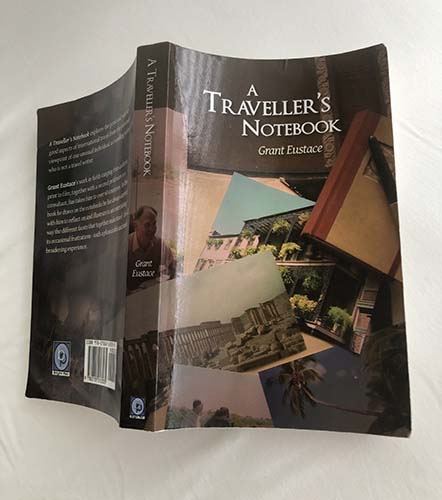The Timeless Good and Bad of Decades of Trips
British author Grant Eustace will tell you that he is a traveling writer and not a travel writer. Nobody makes a writer write, yet writers keep writing because they can’t help it. A professional writer in the field of communication (audio, print, and film), Eustace always jotted notes during several decades of international trips as a consultant.
As for whether a traveler differs from a tourist, “The real traveler is the one taking notes,” he says. And so, he did, in the notebook that he never leaves home without. Sixty countries later, the book is a lively narrative about his observations. Overall, it’s a reckoning between pleasure and frustration. What’s more, he was always eager to take that unsure step that could lead to that lucky encounter.
As you embark on his voyage around the world, often to recurring destinations depending on the chapters’ themes, A Traveller’s Notebook gives you incremental information about the noteworthy.
When Eustace shares his road travel notes, from the perspective of driving or being driven, you’ll find yourself in Gibraltar, where cars must stop to let airplanes land—the road crosses the runway. As for flying, he takes you on his nearly fatal landing of an aircraft, which he obviously lived to write about. Somewhere along the way, you learn that he was an officer in the Royal Navy and a helicopter pilot.
Eustace shares the incongruous sides of travel in a medley of subjects, expressed with attention-grabbing Britishism. And if interest peaks because of a place you visited, Eustace probably had a unique encounter there.
Battlefields might not be your favorite topic, but it would be your loss to skip that part. Eustace is passionate about history, so you’d miss a remarkable crash course in the American Wars, Spanish Inquisition, and WWII. After all, he writes historical documentaries and authored a historical novel.
Spoiler alert: Eustace was researching Rommel’s last days when he found a telegram—in a largely unsorted stack of documents that a wary curator eventually dug out for him. Thanks to his military background, Eustace immediately recognized the message as a war signal. In brief, the document had been ‘lost in transition’ and to a not-so-appropriate filing venue. That discovery proved him right in his relentless search for happenstance.
Eustace’s writing genre equally engages the armchair traveler with a conversational style spiced with humor. He owes this to writing plays and series for BBC Radio 4 and currently for BBC World Services. He loves a good repartee, too. “I am a Protestant in a Catholic country that’s 100% voodoo,” an otherwise off-camera gem of a comment by the then-British Ambassador to Haiti.
In the food chapter, you won’t know whether Eustace is a home cook, but he held his own on culinary encounters, called ‘cultural delicacies.’ As for his take on travel companions, and about women, he comes across as a discerning man who keeps his distance, perhaps out of concern for gender misrepresentation. A territory that decades of matrimony and corporate life have taught him well.
First published in 2010 Suite101

